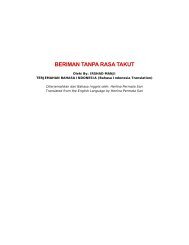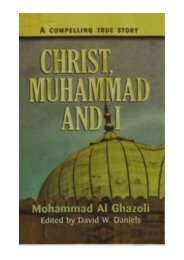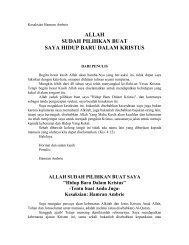A Critical Analysis of 'Real Islam'. Its People ... - Bukti dan Saksi
A Critical Analysis of 'Real Islam'. Its People ... - Bukti dan Saksi
A Critical Analysis of 'Real Islam'. Its People ... - Bukti dan Saksi
You also want an ePaper? Increase the reach of your titles
YUMPU automatically turns print PDFs into web optimized ePapers that Google loves.
A remarkable feature was the urbanity and consideration with which Mahomet treated even the most<br />
insignificant <strong>of</strong> his followers. Modesty and kindness, patience, self-denial, and generosity, pervaded his<br />
conduct, and riveted the affections <strong>of</strong> all around him. He disliked to say No; if unable to reply to a petitioner in<br />
the affirmative, he preferred to remain silent. "He was more bashful," says Ayesha, "than a veiled virgin; and if<br />
anything displeased him, it was rather from his face, than by his words, that we discovered it; he never smote<br />
any one but in the service <strong>of</strong> the Lord, not even a woman or a servant." … He possessed the rare faculty <strong>of</strong><br />
making each individual in a company think that he was the most favored guest. When he met any one rejoicing<br />
he would seize him eagerly and cordially by the hand. With the bereaved and afflicted he sympathized tenderly.<br />
Gentle and unbending towards little children ... He shared his food, even in times <strong>of</strong> scarcity, with others; and<br />
was sedulously solicitous for the personal comfort <strong>of</strong> every one about him. A kindly and benevolent disposition<br />
pervades all these illustrations <strong>of</strong> his character. Mahomet was also a faithful friend. …his affections were in no<br />
instance misplaced; they were ever reciprocated by a warm and self-sacrificing love.<br />
Moderation and magnanimity<br />
In the exercise at home <strong>of</strong> a power absolutely dictatorial, Mahomet was just and temperate. Nor was he wanting<br />
in moderation towards his enemies, when once they had cheerfully submitted to his claims…<br />
Earnestness and honesty <strong>of</strong> Mahomet at Mecca<br />
As he was himself the subject <strong>of</strong> convictions so deep and powerful, it will readily be conceived that the<br />
exhortations <strong>of</strong> Mahomet were distinguished by a corresponding strength and urgency. Being also a master in<br />
eloquence, his language was cast in the purest and most persuasive style <strong>of</strong> Arabian oratory. His fine poetical<br />
genius exhausted the imagery <strong>of</strong> nature in the illustration <strong>of</strong> spiritual truths; and a vivid imagination enabled<br />
him to bring before his auditory the Resurrection and the Day <strong>of</strong> Judgment, the joys <strong>of</strong> believers in Paradise,<br />
and the agonies <strong>of</strong> lost spirits in hell, as close and impending realities. In ordinary address, his speech was slow,<br />
distinct, and emphatic; but when he preached, "his eye would redden, his voice rise high and loud, and his<br />
whole frame become agitated with passion, even as if he were warning the people <strong>of</strong> an enemy about to fall on<br />
them the next morning or that very night." In this thorough earnestness lay the secret <strong>of</strong> his success. … His<br />
inspiration was essentially oracular. His mind and his lips were no more than a passive organ which received<br />
and transmitted the heavenly message.<br />
Benefits <strong>of</strong> Mahometanism<br />
And what have been the effects <strong>of</strong> the system which, established by such instrumentality, Mahomet has left<br />
behind him? We may freely concede that it banished for ever many <strong>of</strong> the darker elements <strong>of</strong> superstition which<br />
had for ages shrouded the Peninsula. Idolatry vanished before the battle-cry <strong>of</strong> Islam; the doctrine <strong>of</strong> the unity<br />
and infinite perfections <strong>of</strong> God, and <strong>of</strong> a special all-pervading Providence, became a living principle in the<br />
hearts and lives <strong>of</strong> the followers <strong>of</strong> Mahomet, even as it had in his own. An absolute surrender and submission<br />
to the divine will (the very name <strong>of</strong> Islam) was demanded as the first requirement <strong>of</strong> the religion. Nor are social<br />
virtues wanting. Brotherly love is inculcated within the circle <strong>of</strong> the faith; orphans are to be protected, and<br />
slaves treated with consideration; intoxicating drinks are prohibited, and Mahometanism may boast <strong>of</strong> a degree<br />
<strong>of</strong> temperance unknown to any other creed. (also: Alms are collected and distributed to the needy).<br />
This picture and representation <strong>of</strong> the man, beloved and worshiped by Muslims worldwide, sounds<br />
like the kind <strong>of</strong> person anyone would want as a friend or neighbor. Unfortunately this is the side reserved<br />
for believers only, and would not be <strong>of</strong>fered to anyone who did not accept his claim <strong>of</strong> prophethood. But<br />
keep this image in mind, as the contrast between this pleasant personality, and the face he <strong>of</strong>fered nonbelievers,<br />
will be the focus <strong>of</strong> the remainder <strong>of</strong> this work.





